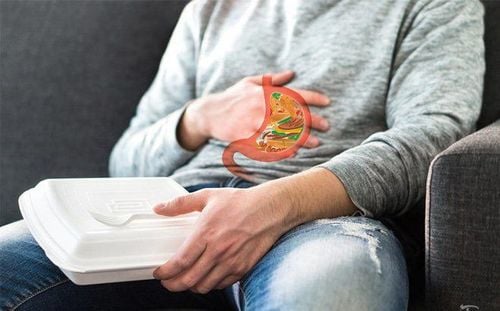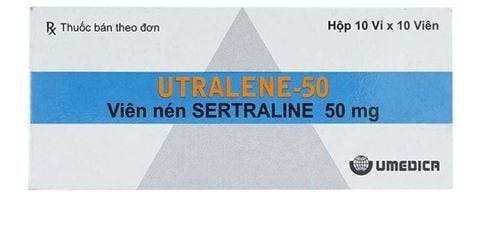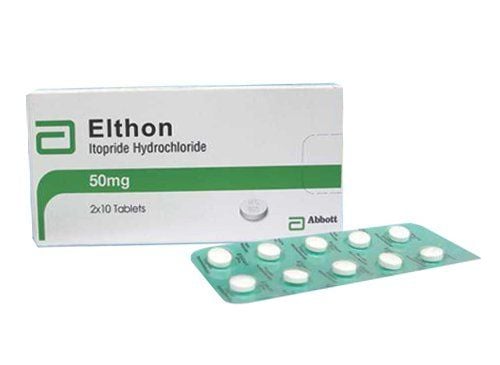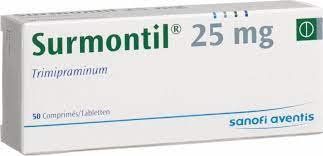This is an automatically translated article.
Levopride 50 has the active ingredient Levosulpiride, which is indicated for the treatment of symptoms of functional dyspepsia and acute or chronic schizophrenia. What are the dosages, side effects and precautions when using Levoproid 50?1. What are the effects of Levopride?
Levoproid 50 has the main active ingredient Levosulpiride, a benzamide group, which has antipsychotic effects by selectively blocking dopamine D2 receptors in the brain. Levosulpiride can be considered as an intermediate between neuroleptic drugs and antidepressants because Levosulpiride has both effects. Levopride is indicated for the treatment of symptoms of functional dyspepsia such as bloating, dyspepsia, heartburn, belching, nausea and vomiting. In addition, the drug is also used in the treatment of acute and chronic schizophrenia.Levopride is contraindicated in patients with hypersensitivity to any of its components; adrenal myeloma; breast cancer; acute porphyria; CNS depression, coma, intoxication with alcohol or other neuroleptic drugs.
2. Dosage of Levopride 50
2.1. Dosage
Adults: Relieve symptoms of functional dyspepsia: The recommended dose is 75mg/day, divided into 3 times. Treatment of schizophrenia: The recommended dose is 200-300mg/day, divided into 3 times. Children: Children over 14 years: Reduce the dose of Levopride. Children under 14 years of age: The safety and effectiveness of Levopride have not been established in children under 14 years of age, so it should not be used in this population. Patients with renal impairment: It is necessary to reduce the dose of Levopride or increase the dosing interval depending on the patient's creatinine clearance, specifically as follows: Creatinine clearance 30 - 60ml/min: Use a dose equal to 2/3 of the normal dose. . Creatinine clearance 10 - 30ml/min: Use half the normal dose. Clearance less than 10ml/min: Use 1/3 of the normal dose.
2.2. How to use
Levoproid 50 is available in tablet form and is for oral use. Patients should take the tablet whole, without chewing, and drink it with 1 cup of cooled boiled water. Levoproid should be taken before meals to achieve the best effect.3. What are the side effects of Levopride?
Patients using Levoproid 50 may experience side effects including:Common: Nervous: Insomnia or drowsiness, tremor. Endocrine: Increased blood prolactin secretion, increased lactation, amenorrhea, menstrual disorders. Uncommon: Neurological: Overstimulation, extrapyramidal syndrome, Parkinson's syndrome. Cardiac: QT interval prolongation, arrhythmia, torsades de pointes. Rare: Endocrine: Gynecomastia in men. Neurological: tardive dyskinesia, neuroleptic malignant hyperthermia. Blood pressure: Orthostatic hypotension, bradycardia or arrhythmia. Other: Hypothermia, photosensitivity, cholestatic jaundice.
4. Notes when using Levopride 50
Levopride should be used with caution in the following patients:People with epilepsy because of a low seizure threshold. The elderly are more susceptible to orthostatic hypotension, somnolence and extrapyramidal effects. People who drink a lot of alcohol or are taking drugs that contain alcohol because it increases drowsiness. People experience hypomania because low doses of levosulpiride can make symptoms worse. Patients with unexplained high fever should discontinue Levopride to rule out neuroleptic malignant syndrome. Patients may experience dizziness or drowsiness while taking Levopride. Therefore, patients should exercise caution when driving and operating machinery. Pregnancy: Like other neuroleptics, Levosulpiride crosses the placenta and may cause adverse effects on the nervous system of the fetus. Therefore, Levopride should not be used during pregnancy, especially during the first 16 weeks. Lactation: Levosulpiride is excreted in relatively large amounts in human milk and may cause undesirable reactions in the nursing infant. Therefore, women who are breast-feeding should not take Levopride or should discontinue breast-feeding if taking it.
5. Drug interactions
Drug interactions can alter the effectiveness of treatment and/or increase serious side effects. Patients should inform their doctor of all medications, supplements and vitamins they are taking for advice on appropriate use. Here are some drug interactions to watch out for when using Levopride 50:Sucralfate or antacids containing aluminum or magnesium will reduce the absorption of Levosulpiride. Therefore, Levosulpiride should be taken at least 2 hours apart from the above drugs to avoid interactions. Lithium may increase the extrapyramidal potential of Levosulpiride by increasing the binding of Levosulpiride to dopaminergic D2 receptors in the brain. Monitor patients carefully when combining these two drugs. Levodopa is a competitive antagonist of Levosulpiride and other neuroleptics. Therefore, concomitant use of Levosulpiride with Levodopa is contraindicated. Alcohol may increase the sedative effects of Levopride. Patients should avoid alcohol and other alcoholic beverages while taking the drug. Antihypertensives: Levopride can increase hypotension and cause orthostatic hypotension, so care should be taken when combining these drugs. Above is information about uses, dosage and precautions when using Levopride. If you have questions or need more information about your medication, you should contact your healthcare provider for answers.
Please dial HOTLINE for more information or register for an appointment HERE. Download MyVinmec app to make appointments faster and to manage your bookings easily.













